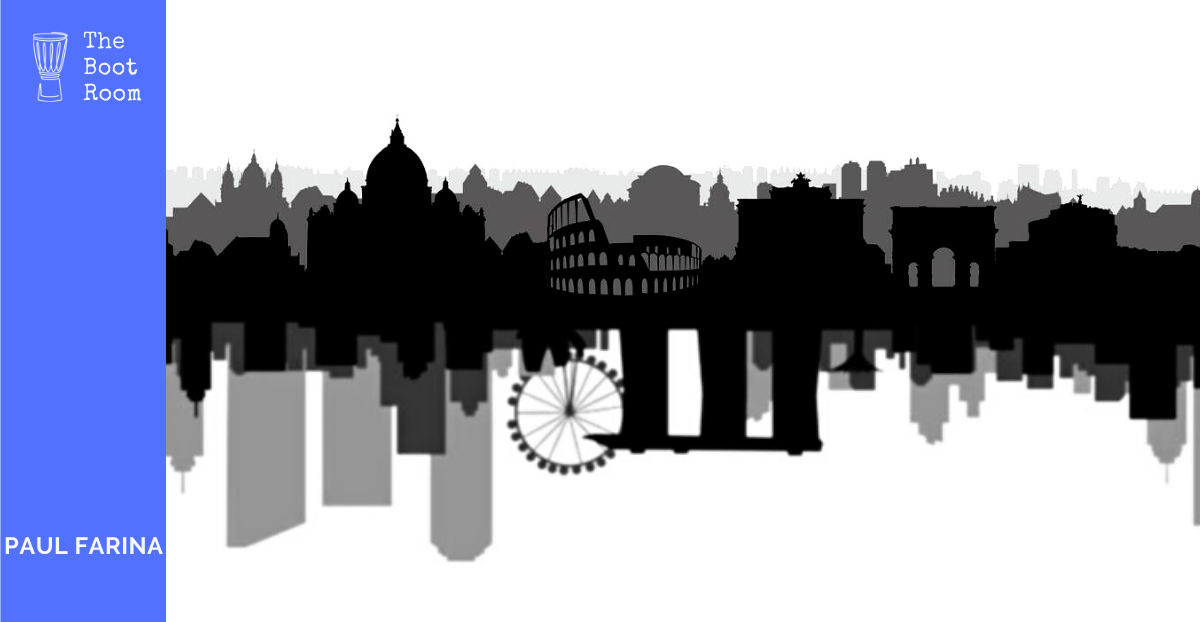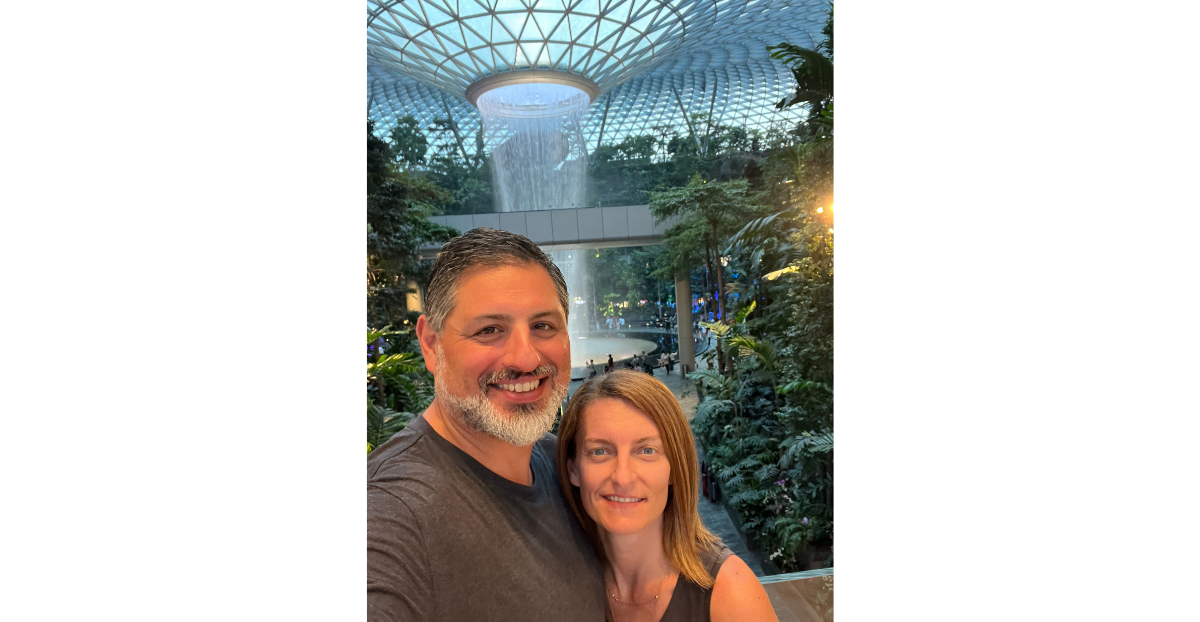Rome or Singapore?
Our recent trip from Rome to Singapore included 13 hours in the air and just under six hours in transit (including a two hour delay due to rain storms in Istanbul). These sorts of flights are never fun, but the beautiful thing about flying is that within 24 hours you are transported from one world to another.
During our vacation in Rome we spent time with extended family. This is a real treat for getting a local's experience and some superb home cooking. We were fortunate to be driven around and given a deep education of the city with it's endless stories - from the beginning to the fall of the Roman Empire to the modern history and contemporary life of today's Romans. The tales are endless and it explains why Italy has such a deep sense of pride and protectionism of it's culture, traditions and art.
Yet, Rome comes at a cost. With such preservation very few systems and processes work. From electricity, to running water, to the roads, to even the cemeteries! All of it is hard work and is either slow or some-what broken. When we visited the grave of a dear auntie the signage was so poor we got lost while the upkeep of the entire estate was appalling. There were overgrown bushes and trees everywhere as well as buckling roads well past their expiry date. The administration building was running so poorly it left twenty-plus cars of mourners waiting for hours on a stinking hot day before they could bury their loved one sitting in a hurst on the road - truly awful.
Italy is famous for it's cuisine. Going out for a meal is one of the pleasures and simultaneous pains of Italian culture. I am all for relaxing and taking time - a feature of places like the South Pacific islands where time seems to not exist at all. But, be warned when in Italy - approach your restaurant of choice at least 30 minutes earlier than feelings of hunger begin. We found ourselves laughing at how it took ten minutes to be acknowledged and shown to our seat. Then another five minutes or so to be shown a menu, five-to-ten again to have our order taken, and anywhere from 20-60 minutes to get our food (note - these timings are conservative!) This was experienced often and was simply explained as 'the way of life' in Italy. My observation was of staff working very hard while being stressed and stretched but achieving very little - broken systems and a very low Return on Effort.
Is this because everything in Rome is old? The utilities, the infrastructure, the mentality...?
The fact my trousers became difficult to fasten by the end of our time there meant I still left a very happy man. The food is as amazing as it's reputation. When we sat down with a friend of mine (an executive chef) we discussed how it takes real confidence to serve pasta so al dente with only one or two ingredients in the sauce. Such simplistic food comes from a confidence only a culture of thousands of years of existence can achieve. Having a long history is not all bad. Things may not work well but quality can still be found.
Then, we landed in Singapore. One of the cleanest, slickest, shiniest cities you'll come across. The airport itself is noticeably well signed with people everywhere to help and direct you. The Jewell (within the airport) provides one of the most beautiful and visually striking indoor features you'll ever see. The place is beautifully designed and everything just works. A taxi is waiting before you need one. Hotel check in requires zero waiting - the person next in the chain of your service just magically appears. Throw them a curve ball and they seem to simply smile and deal with it. This was the same at the local food market where a bowl of the best noodles you'll ever have is less than a tenner, all the way through to having one of the most over-priced cocktails you'll order at the top of the Marina Sands Hotel. The lifts are quick. The water pressure in the showers is strong. The internet is lightning. And, not one piece of litter (sorry, I lie - my wife and I spotted the first piece of litter on the street on our final day there). Opposed to Rome where the roads stunk of dog piss and rubbish was strewn and flying about everywhere (a sad and sorry sight).
driving down the suburban street of our accomodation the street bins were constantly full and traffic was
a constant battle
Image Source: Paul Farina
Visually and experientially the chasm is wide between the two. One - ancient, broken and experienced. The other - new, functional and optimistic. It made me think of all the teams I have worked with. The intricacies, demographics, and personality of the culture of teams. Some are full of long tenures and ancient mentalities. Some are fresh faced, highly dynamic and struggling with constant change. It is a good frame for understanding your team - is it all history or all future?
Is your team Rome?
Full of classic hits like the Rolling Stones or The Beatles?
Doing and saying the same things as years ago like a TV personality still going (or limping) after decades? I'm looking at you Darryl Summers (for Aussie readers)
Using antique processes and systems as your core infrastructure like a car without power steering and anti-lock brakes?
Or, is your team Singapore?
Continually hitting the charts with new sounds like Taylor Swift or Beyonce?
Continually updating and iterating the ways of working to be on-or-in-front of the curb like doco extraordinaire David Attenborough or comedian Ricky Gervais
Continually investing-in and updating processes and systems with infrastructure ready for future needs like a young couple with a sports car that's also a SUV?
The Jewell - Singapore Airport
Image Source: Paul Farina
Your team may have a mix of the two, but will tend towards one end of the spectrum. As with any instinctual diagnosis it is not to be judged, rather to be observed. If there is dead wood dragging your operation down it is best to face this, which may include embracing the heritage of this or taking a broom to it. If everything is new and sparkly it is good to know this and ensure experience is not being tossed out too quick and too often, and that sticky change is good rather than continual and costly changes of staff/tools/products/processes.
All cities are unique as are all teams and all have decisions to take what they have and leverage for a bright future. Even in Rome, the locals I talked with are optimistic for a better future as they believe in their younger generations. My hope is you too have optimism for your teams future, whatever your current place on the Rome-to-Singapore spectrum. Whatever your starting point on this spectrum, there is equity to leverage, learnings to guide your decisions and opportunities to evolve how your team operates so all benefit.
Banner Image Source: VectorStock



